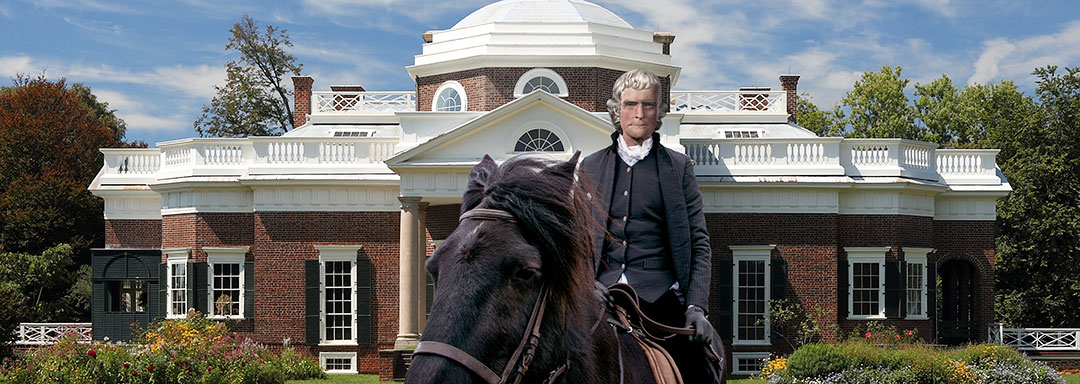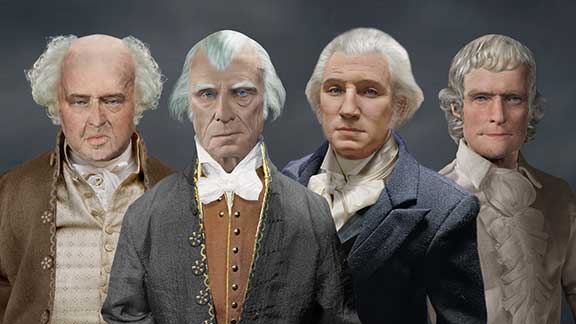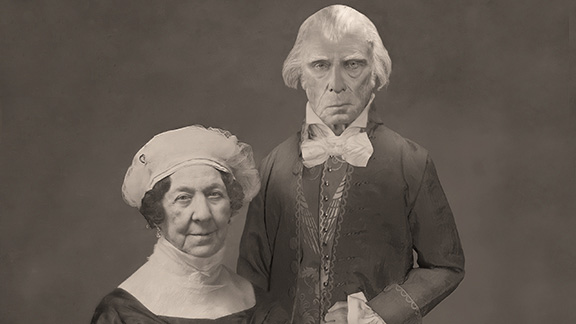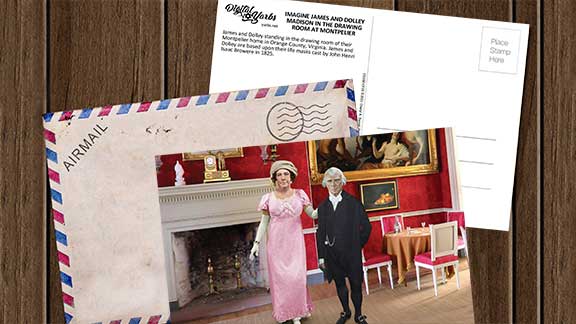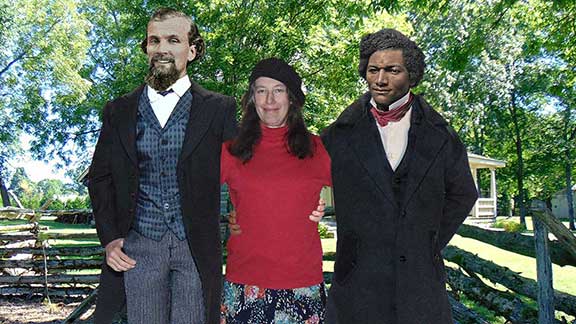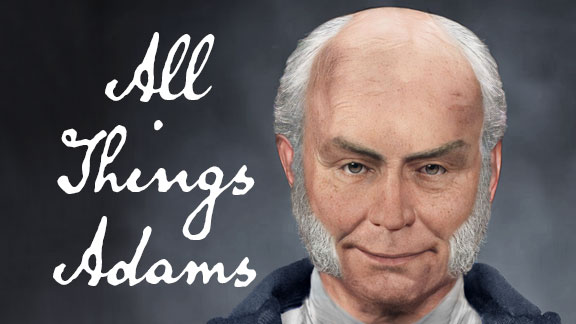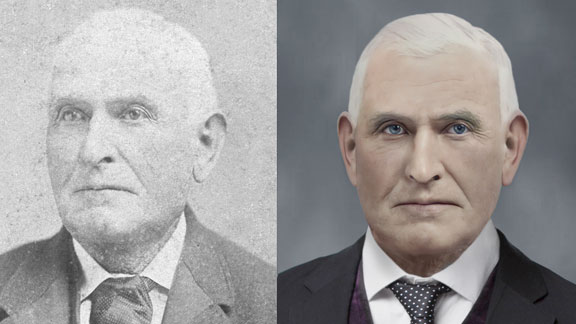Home >> Lost Photographs of History >>Thomas Jefferson on Horseback at Monticello
Jefferson’s Fine Horsemanship
Upon our second visit to Monticello, Thomas Jefferson’s home in Virginia, we had the great pleasure of seeing him with his horses.
I knew I had to get a photo of this. Just wait until the folks back home, “in the future,” see this……Thomas Jefferson, on his most well-known riding horse Caractacus.1
“Pen of the Revolution. Sage of Monticello. Man of the People. The third president of the United States is known for many things. What you probably didn’t know is that T.J. – as Jeffersonian scholars affectionately refer to him – was also a passionate lover of horses.”2
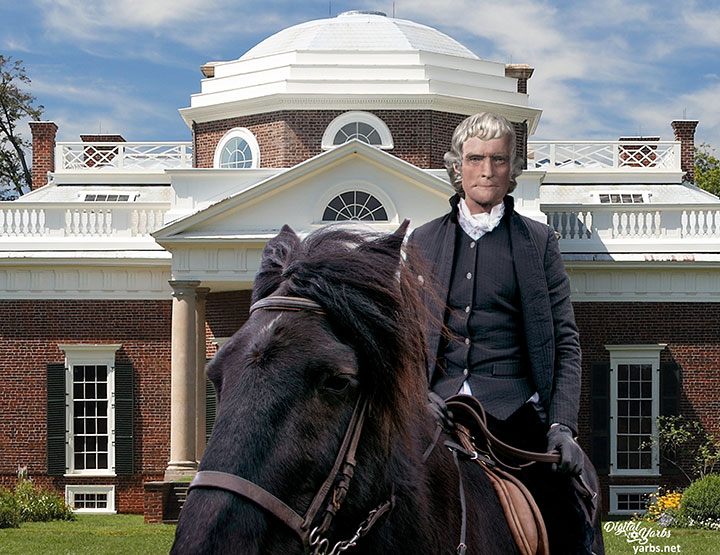
Thomas Jefferson on horseback at Monticello. Image made from the 1825 life mask casting of Thomas Jefferson’s head and upper torso by J. I. Browere. Background image of Monticello by Martin Falbisoner / CC BY-SA (https://creativecommons.org/licenses/by-sa/3.0)
“We generally worked mules on the plantation; but he would not ride or drive any thing but a high-bred horse. Bay was his preference for color. He would not have any other. After he came from Washington he had a fine carriage built at Monticello, from a model that he planned himself.’ The wood-work, blacksmithing, and painting, were all done by his own workmen. He had the plating done in Richmond. When he travelled in this carriage, he always had five horses—four in the carriage, and the fifth for Burwell, who always rode behind him. Those five horses were Diomede, Brimmer, Tecumseh, Wellington, and Eagle.”3
“Much time and expense were devoted by him to ornamenting and improving his house and grounds. A great lover of nature, he found his favorite recreations in out-of-door enjoyments, and it was his habit to the day of his death, no matter what his occupation, nor what office he held, to spend the hours between one and three in the afternoon on horseback. Noted for his bold and graceful horsemanship, he kept as riding-horses only those of the best blood of the old Virginia stock. In the days of his youth he was very exacting of his groom in having his horses always beautifully kept; and it is said that it was his habit, when his riding-horse was brought up for him to mount, to brush his white cambric handkerchief across the animal’s shoulders and send it back to the stable if any dust was left on the handkerchief.”4
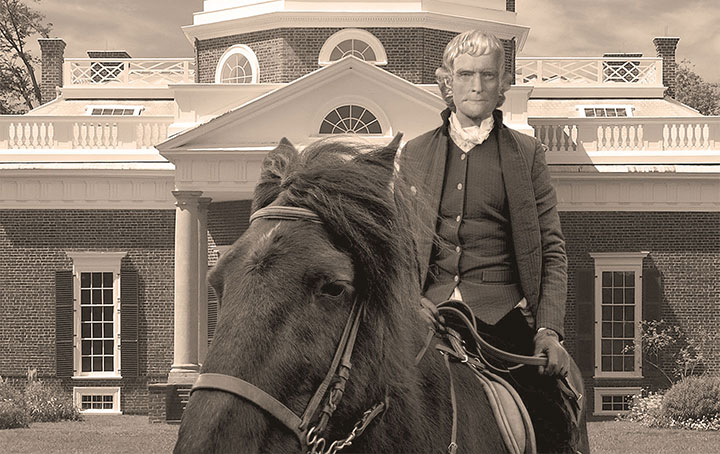
Thomas Jefferson on horseback at Monticello. Image made from the 1825 life mask casting of Thomas Jefferson’s head and upper torso by J. I. Browere. Background image of Monticello by Martin Falbisoner / CC BY-SA (https://creativecommons.org/licenses/by-sa/3.0)
“Monticello’s longest-serving overseer, Edmund Bacon, described Jefferson as ‘an uncommonly fine rider – sat easily upon his horse and always had him in the most perfect control.’”5
“According to Memoirs of a Monticello Slave by Isaac Jefferson, while Thomas Jefferson was governor of Virginia, British forces came close to capturing him several times, but he managed to elude them by escaping on horseback.”6
“According to a Charlottesville slave, named Aunt Polly: ‘Mr. Jefferson would always go out in any kind of weather, never minding it in the least, winter or summer. Sometimes rain would be pouring down, or the snow would be blinding so that you couldn’t see a yard ahead, yet he would order his horse to be brought to the gate, and would mount and ride wherever he intended to go.’”7
“Jefferson once wrote that he hoped to die on a horse, and he nearly got his wish. The man continued to ride daily until a few weeks before his death in 1826, at the age of 83.”8
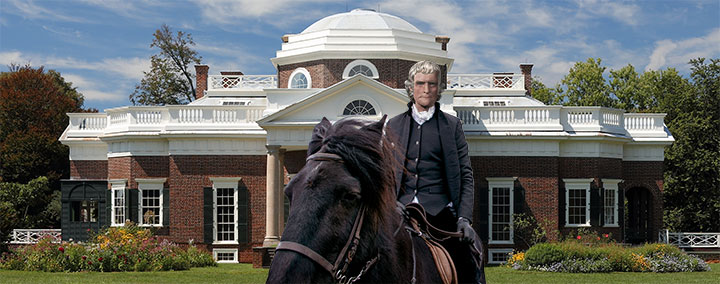
Full Size Image of Thomas Jefferson on horseback at Monticello. Image made from the 1825 life mask casting of Thomas Jefferson’s head and upper torso by J. I. Browere. Background image of Monticello by Martin Falbisoner / CC BY-SA (https://creativecommons.org/licenses/by-sa/3.0)
Life Mask Reconstructions
The above images of Thomas Jefferson are Photoshop compositions using the face of Jefferson taken from his life mask. The life mask was cast from a plaster mold of Jefferson’s head and upper torso in 1825 by J. I. Browere.
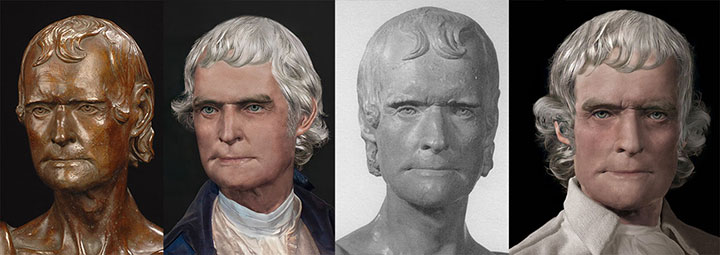
Photoshop life mask before and after reconstructions of Thomas Jefferson

Sources & References:
1Thomas Jefferson Monticello. “Thomas Jefferson Encyclopedia – Caractacus” https://www.monticello.org/site/research-and-collections/caractacus
2,5,7,8Alys Matthews. “Hooves through history: The untold story of Thomas Jefferson’s daily rides” Richmond Times Dispatch. Sep 20, 2017 https://www.richmond.com/hooves-through-history-the-untold-story-of-thomas-jefferson-s/article_cc8f45bc-9e24-11e7-8a3a-cb8c1e71659d.html
3Hamilton W. Pierson
4Sarah N. Randolph. “The Domestic Life of Thomas Jefferson Compiled From Family Letters and Reminiscences ” New York:Harper & Brothers, Publishers, Franklin Square. 1871 https://www.gutenberg.org/files/43331/43331-h/43331-h.htm (Public Domain)
6Presidential Pet Museum. February 28, 2016 http://www.presidentialpetmuseum.com/blog/thomas-jefferson-horse-caractacus/
